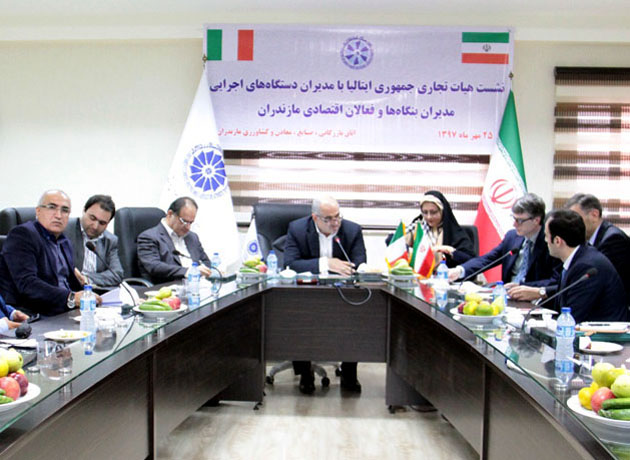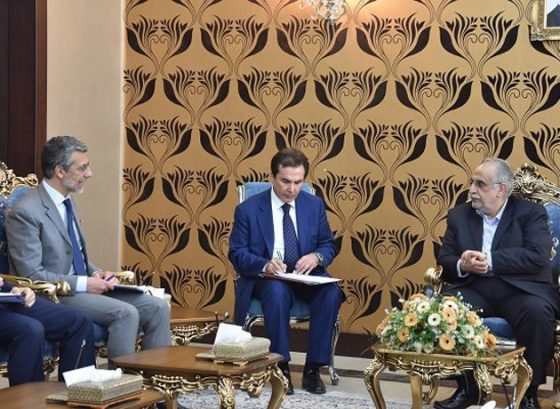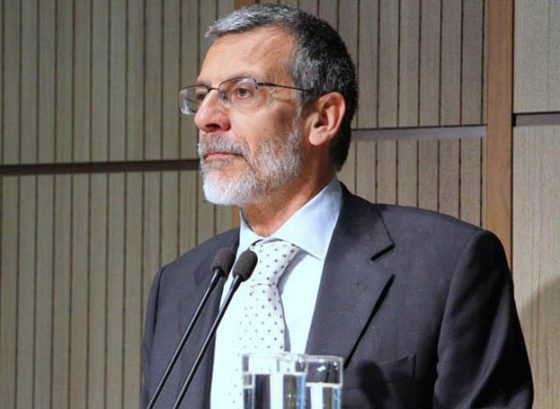Italy after Expanding Economic Ties with Iran

Italian Trade Commissioner in Iran Augusto Di Giacinto announced on Wednesday that Italy is eyeing expansion of mutual cooperation with Iran, AVA Diplomatic reports.
The Italian official made the remarks in a visit to Iranian Northern Province of Mazandaran, calling for provision of necessary grounds to expand mutual cooperation.
Heading an Italian economic delegation, Di Giacinto met with Iran’s senior trade authorities in Sari, the capital city of the province. In the meeting, the Italian official reassured that Italy will remain Iran’s friend in hard times.
Di Giacinto noted that Italian commercial sector has been making efforts from long ago to consider ways to continue cooperation Iran and tap the great potentials and capacities of the Iranian market.
According to him, despite the difficulties hindering joint cooperation, the Italian economy is eager to cooperate with Iran.
“We should provide the grounds for cooperation between Italian and Iranian investors and traders,” he added.
He urged that necessary actions should be taken to remove the banking hurdles such as liquidity and money transfer.
The US has been trying to cut off Iran’s access to SWIFT and hamper the country’s financial ties since May when US President Donald Trump unilaterally pulled out of Iran’s nuclear deal with world powers.
The official stressed that the Italian embassy are seeking cooperation in different Iranian provinces with their considerable potentials.
Italian Ambassador to Iran Mauro Conciatori announced on Monday that Rome is determined to bolster and enhance mutual cooperation with Tehran.
“Although there are problems ahead of joint cooperation between Iran and Italy, Italian industrial and production units are vehemently seeking to broaden their trade and business cooperation with the Islamic Republic of Iran,” the ambassador maintained.
“All European countries are vehemently waiting to see what will happen to the future of Iran and Europe economic ties after November 4,” added the Italian diplomat.
US President Trump has threatened to curb Iran’s oil revenues to zero by November 4 in a move described by his administration as the harshest economic measures against any country in the world.
“However, Italy’s commercial envoys and Chamber of Commerce in cooperation with Iran Chamber of Commerce, Industries, Mines and Agriculture (ICCIMA) has tried to explore avenues for broadening trade and business cooperation,” opined Concuatori.
Touching upon small and medium-sized enterprises (SMEs), he said, “In this regard, it is necessary that suitable ways should be paved for enhancing and boosting level of business cooperation with Iranian SMEs.”
Italian government will support Iranian companies in all fields, he said, adding, “Italy is staunch supporter of Joint Comprehensive Plan of Action (JCPOA), Iran’s official nuclear title, the issue of which was stressed by Iranian President Rouhani and Italian prime minister on the sidelines of the United Nations General Assembly (UNGA).”
Iranian officials announced in September that the new financial mechanism to be used by the European Union would be implemented by the EU in November.
“The Europeans have to establish the mechanism before November 4, when the new round of sanctions is to start,” Iranian Deputy Foreign Minister Seyed Abbas Araqchi said.
He underlined that the EU’s special purpose vehicle (SPV) was intended for easing banking and trade transactions with Iran.
“Europeans are aware of our expectations that the SPV’s structure should be clear by then and at least some section of the mechanism should start working,” Araqchi said.
The Iranian deputy foreign minister reiterated that in fact November 4 has had an official aspect and a strange thing is not supposed to happen on this day.
European Union Foreign Policy Chief Federica Mogherini said last month that a so-called Special Purpose Vehicle (SPV) would facilitate trade with Iran and it would go into force before November.
The SPV aims to keep trade flowing even if possible US sanctions hit Tehran.
European diplomats have previously described the SPV proposal as a means to create a barter system, similar to one used by the Soviet Union during the Cold War, to exchange Iranian oil for European goods without money changing hands.
US President Donald Trump announced on May 8 that Washington would no longer remain part of the Joint Comprehensive Plan of Action and promised to re-impose the highest level of economic sanctions against Iran.
The sanctions reinstated on Iran on May 8 included boycott of Iran’s crude supplies and bans on transfer of its crude revenues. There is a 180 days interval before these sanctions come into effect. Other US secondary sanctions were reinstated last month.
After Trump’s declaration, the Iranian government issued a statement, calling the US withdrawal as “unlawful”. The statement underlined Iran’s prerequisites for continuing the deal with the five world powers. These conditions that were reiterated later by Iran’s Supreme Leader Ayatollah Seyed Ali Khamenei later mainly included Iran’s guaranteed crude sales and transfer of its revenues back home.




